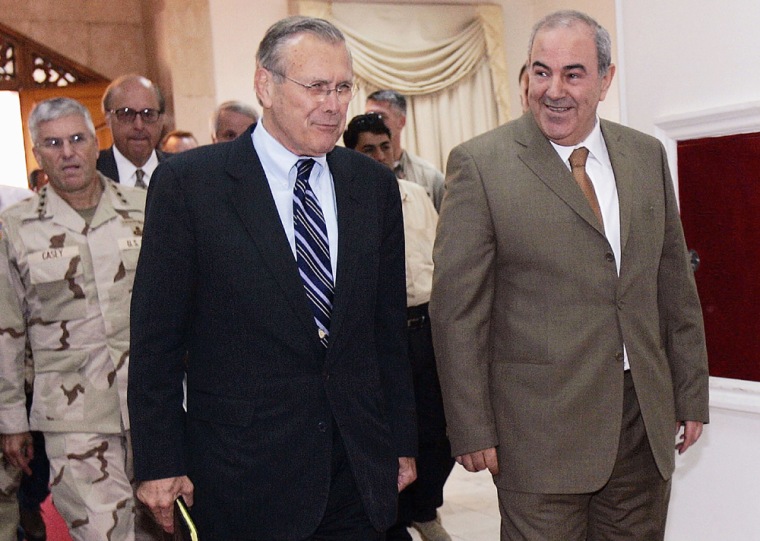Like him or not, interim Iraqi Prime Minister Ayad Allawi's determination is as indisputable as his temper.
Like the different sides of his personality, in two separate speeches, recently he painted very different pictures of Iraq.
To the U.S. Congress in Washington he said his government was winning the war against the insurgents, but to his own interim assembly here, he said the nation faces some very grave challenges.
In a recent interview, Allawi discussed what he sees as the real Iraq.
Kevin Sites: In two recent speeches you’ve given very different assessments of Iraq. What is the reality?
Allawi: We are winning. We are winning definitely. We are gaining ground.
What about the violence in Ramadi and Fallujah?
I was [recently] with the Fallujah people. They came here to see me and they were begging me to help them with the insurgents.... So we are gaining ground. But I want to tell my people the reality. That this is not a classical war. We will gain ground. We will win, but we will have setbacks.
We are not saying anything which is not true. We have liberated Najaf. We have liberated Samarra. We have liberated Tal Afar, Mosul. This is causing a lot of disturbance amongst the terrorists. And they see themselves as losing. And they see themselves continuously on the decline. So out of desperation, they are hitting us as hard as they can because they know this is the last stand.
What are the conditions of the peace deal with radical Shiite cleric Muqtada al-Sadr?
The dismantling of any militias, the surrender of weapons to the government, and becoming part of the political process. If they see fit, they can use amnesty, except for those who have committed crimes. So these are the conditions, it's very straightforward.
Anybody who respects these conditions we are ready to do business with. If they don't respect these conditions, they will be brought to justice.
Will amnesty be extended to al-Sadr?
We don't know. There is the judicial system. As far as not committing crimes is concerned, anybody can use the amnesty. It’s there for people who have not committed murders. So if he falls within this category, of course he can use the amnesty.
What about the recent offensives in Samarra and Babil?
They were based on the discussions with people. I personally met at least four times with the leaders of Samarra, the tribes and the clerics. And they were adamant that they wanted the help of the government. We gave the insurgents a timetable: We said to them if you don't leave we are going to force our way in to help the people and to have the rule of law prevail.
There are complaints that the offensive in Samarra came at too high a cost, that many civilians, including women and children, died.
In any conflict, civilian casualties do occur. We are suffering much more from the suicide bombings which are killing civilians, bombing our cities, our people, our recruitment offices, our hospitals. No one is safe. Any civilian casualties are a loss to Iraq. But the loss of civilians is not because of the government, but because of the insurgents.
Which insurgent-held city is next? Ramadi?
Any place which is turbulent. Where terrorists and insurgents are acting against the will of the Iraqi people, the government is going to intervene, by peace, by outreach or by force. We have an amnesty and if they want to join.
We are in the doorsteps of the elections; if they want to be part of the election process, they can. There's no problem at all there; if they have the real support of the Iraqi people, then they should join the political process.
Is there an offensive imminent for these cities?
We have plans everywhere really. Anywhere there is turbulence, we have plans. But we at the same time have a political process going, [we are] talking to people.
As far as we are concerned, the safety of the people is the main concern. We are not going to allow the people to be compromised by foreign terrorists and by insurgents who with Saddam Hussein massacred the Iraqi people over three decades. We are not going to allow this to happen.
How much closer are you to catching Jordanian terrorist Abu Musab al-Zarqawi?
We don't know exactly where he is, but we know the areas that he uses, from Fallujah to southwest Jarbala, Hilla, north Babil area and also he used to move to Samarra.
How important is it to capture al-Zarqawi in terms of bringing peace and stability to Iraq?
You have to see him within the context of his radical organization, which is built around hatred and murders and killing people and inciting hatred, racial hatred. And unfortunately using Islam to inject their poison into the society and kill people and kill innocent lives. We are not going to allow them to do this in Iraq. We will keep on fighting them, and we will pursue them until we bring them to justice.
Are you ready for the January elections? Are they going to go ahead as planned?
Yes.
Without a doubt? No matter what?
Yes.
Is there anything that in any way could delay them?
Nothing.
